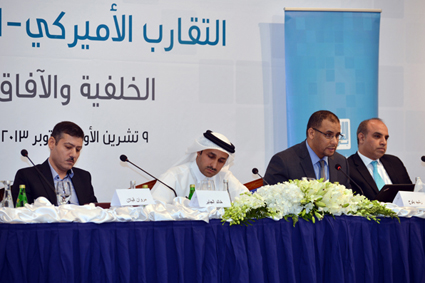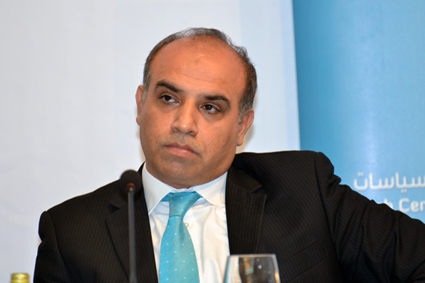 |
|
Attendees at the Conference
|
Repercussions of the possibility of an enhanced scope for Iranian-American rapprochement since Hassan Rouhani’s ascent to Iran’s presidency captured the majority of the discussions that followed panelist presentations at a research seminar organized by the Arab Center for Research and Policy Studies on October 9, 2013 in Qatar. Panelists and participants of the seminar, Iranian-American Convergence: Background and Prospects, agreed that Arabs would likely stand to lose the most in such a warming in relations given the compromises that might be forthcoming on many issues deeply linked to the Arab world. In addition, given that the major Arab states, such as Egypt and Saudi Arabia, are preoccupied with their internal affairs, and others are experiencing dire circumstances, such as Syria, the rapprochement could entail a strengthening of Iranian regional influence at the Arabs’ expense.
 |
|
Speakers on the Historical Experience
|
Seminar presenters were, however, skeptical on whether an advanced stage of convergence of Iranian-American relations would actually take place. Dr. Mahjoob Zweiri warned against hastily-drawn conclusions as the relationship between Iran and the US remains extremely complex, with a great deal of caution being taken by both countries. He suggested that recent developments were something of an Iranian tactic to counteract a negative image of revolutionary Iran resulting from its stance on the Arab revolutions. On the other hand, Dr. Marwan Qabalan observed that the subject of rapprochement was much more difficult than is generally depicted in the media, and Dr. Rachid Yalouh felt that Iran and the US could find greater scope for convergence in the future around cultural issues.
An Iranian Face-Saving Tactic?
 |
| Dr. Khalid al-Jaber |
At the outset of the seminar, panel chair Dr. Khalid al-Jaber indicated that a series of events took place after Hassan Rouhani became president, pointing to a thawing of Iranian-American relations. The first indication was the publication of Rouhani’s article “Why Iran Seeks Constructive Engagement,” in the Washington Post,[1] particularly since he previously served as one of Iran’s nuclear negotiators. In the article, Rouhani wrote that Iran wished to arrive at an agreement with the West over nuclear power within three months. His address to the UN General Assembly followed this article, which was in turn followed by his telephone conversation with President Barack Obama.
Dr. Mahjoob Zweiri, professor of Iranian and Contemporary Near Eastern History at Qatar University, presented his paper entitled “President Rouhani and Iran: An Old Book with a New Cover?”. Dr. Zweiri held that the primary question pertains to whether Iran has really changed its perspective on America since Rouhani took over the presidency. He observed that, since 1989, Iran has, in its relations with the United States, Europe and the world at large, consistently made the effort to promote a new image of the country abroad whenever a change in the internal politics of the country has taken place. What accentuates the political and media buzz around this oft-repeated track is no doubt Western nations’ high hopes for a prospect of some real change in the Islamic republic’s attitude and positions. He went on to observe, though, that such hopes, sad to say, have not been realized and that this situation has continued without any real shift for decades.
Dr. Zweiri affirmed that for Iran the question of “saving face,” or protecting its “image,” is of great importance, for it wishes to project the image of a capable pow
 |
| Dr. Mahjoob Zweiri |
er that can contribute to solving regional problems, and, ultimately, to gain recognition of its regional weight. The reciprocal view that Iran and the US have for each other is the key to their relationship, which governs Iran’s relationship with other Western nations. Furthermore, Washington is Iran’s gateway to the rest of the world. No doubt the ideology of the Iranian regime in place since the 1979 revolution, based on enmity toward the US, is a major defining feature of relations between the two countries.
Additionally, he noted that Iran’s economic situation over the past eight years is an influencing factor in the rapprochement between Iran and the US, alongside internal political changes in Iran, such as Rouhani’s election to the presidency. Rouhani and his administration have admitted that the impact of the sanctions placed on the country, in addition to the economic damage they caused, have taken on dimensions that threaten internal security; this has led the new president to find a way to lighten this impact. Dr. Zweiri also maintains that the recent developments in Iranian-American relations are nothing more than an Iranian “tactic” to face the damage done to Iran’s revolutionary credentials by the positions it has taken with regard to the Arab revolutions.
He summed up his views by stating: “It is important not to exaggerate when drawing conclusions [about the prospects of a convergence between the two countries] since the relationship between the two countries is exceptionally complicated, and both sides are proceeding with great caution.” The prospects of rapprochement are governed by two factors, he stated: convincing public opinion in the two countries of the rapprochement’s feasibility and the regional powers’ acceptance of a rapprochement, primarily Turkey and Israel.
 |
| Dr. Marwan Qabalan |
Dr. Marwan Qabalan, a researcher at the ACRPS, surveyed the historical trajectory of Iranian-American relations, concluding that they were strained for decades, but took on dimensions of open enmity and rivalry after the Iranian Revolution, especially with Iran’s intent to become the principle power in the region. Such aspirations gained momentum after September 2001, when Iran took advantage of the mistakes made by the US after it helped topple Iran’s two main contenders for regional power, Iraq and Afghanistan.
According to Dr. Qabalan, the economic factor and the impact of sanctions have been the most prominent factors leading to the convergence between Iran and the US, though the Syrian situation is another contributing factor. Over time, Iran has come to realize that its nuclear program, through which it hoped to enhance its regional sway, was a financial burden, especially in light of the sanctions, leading the country to search for other less costly ways of enhancing its influence. Dr. Qabalan anticipates that Iranian-American negotiations will figure in the coming period, though how it will occur depends upon the nature of the US’s expectations for concessions from Iran.
 |
| Dr. Rachid Yalouh |
Dr. Rachid Yalouh, a researcher at the ACRPS, noted that the cultural sphere is one of the most important foundations upon which progress toward a rapprochement between the two countries should be advanced. Areas for cultural cooperation may offer greater scope for success than previous approaches, he suggested, particularly since it now appears that the Supreme Leader Ali Khamenei is supportive of rapprochement. In his paper “Cultural Background to the Iranian-American Convergence,” Yalouh stresses that the United States generally seeks to maintain cultural bridges with Iran, built over long decades, even during periods of political tension.